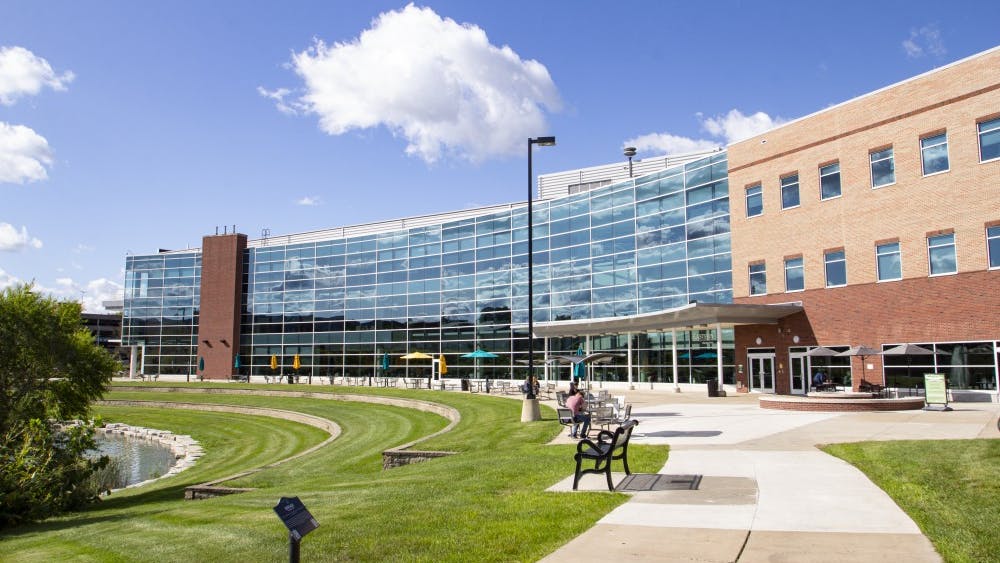Members of the EMU community staged two protests in response to a federal civil rights lawsuit accusing EMU officials of ignoring claims of sexual assault on or near campus.
The protests, held Thursday, March 25, and Sunday, March 28 drew hundreds of people who shared personal stories and experiences, marched across EMU campus, and expressed their frustrations together outside of Pease Auditorium.
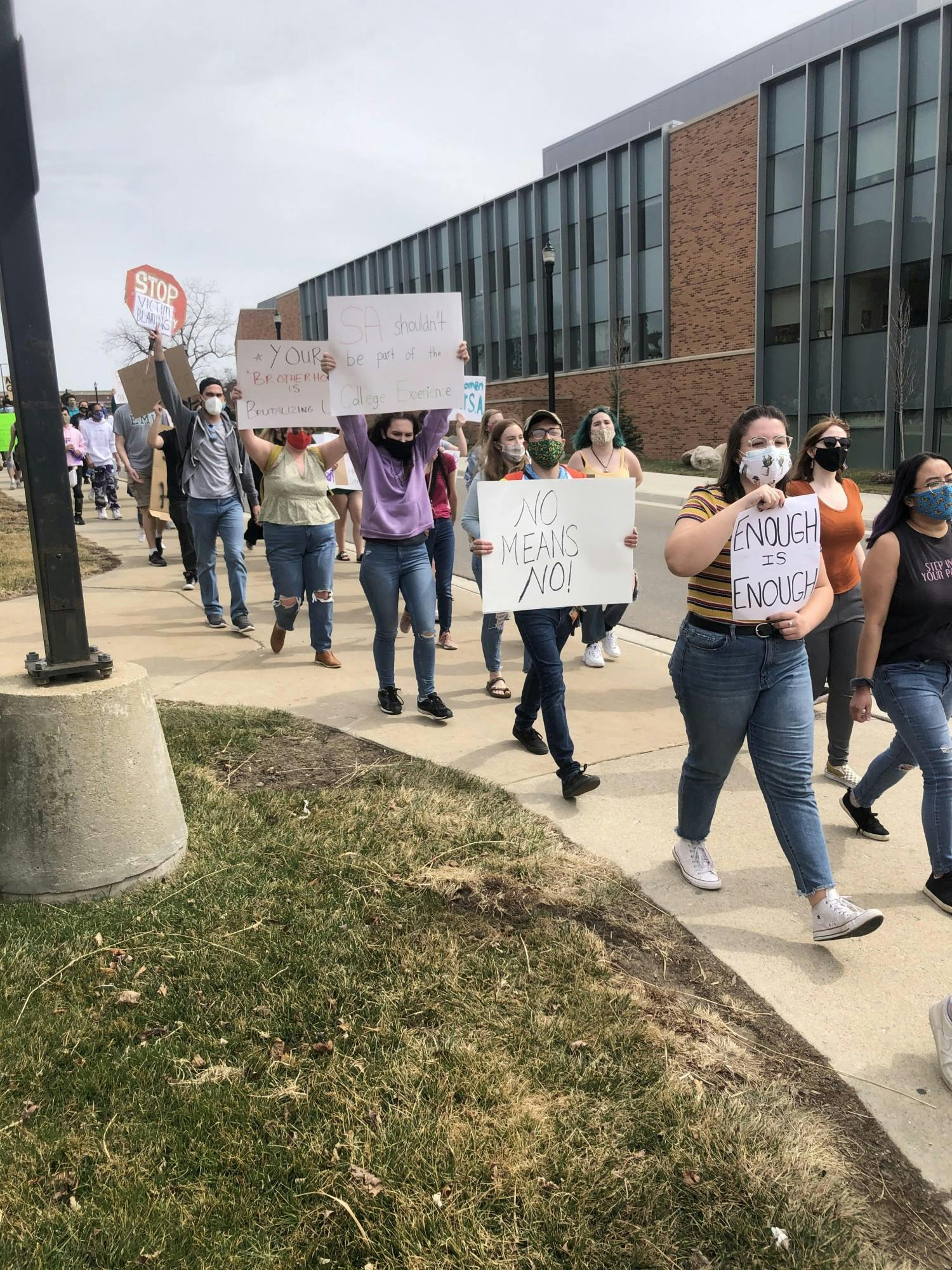
The lawsuit that started the uproar
Eleven women came forward accusing the University of covering up and ignoring their Title IX reports. The women said they were raped and touched without their consent, by four different men, when they were students at EMU. Three of the men, Dustyn Durbin, Thomas Hernandez, and D’Angelo McWilliams, a Washtenaw County Sheriff’s deputy, are facing criminal charges.
Those named in the lawsuit are Melody Werner, Michigan State University’s (MSU) Office of Institutional Equity Director (OIE), the EMU Police Department, Police Chief Robert Heighes, and Deputy Chief Daniel Karrick, as well as the local and national fraternity chapters of Alpha Sigma Phi and Delta Tau Delta.
Werner served as EMU’s Title IX Director from 2015 to 2019, leaving in November 2019 to work at MSU. As MSU’s OIE, Werner is responsible for overseeing the investigation of Title IX reports that fall under the University’s Relationship Violence and Sexual Misconduct and Anti-Discrimination Policies.
EMU released a statement saying that Werner’s job is to do the opposite of the claims against her listed in the lawsuit.
"Melody Werner categorically denies ever saying anything of that nature to any individual reporting a sexual assault. Her career as a Title IX professional is dedicated to exactly the opposite - encouraging survivors to come forward and report what happened to them and to support them in any way possible.”
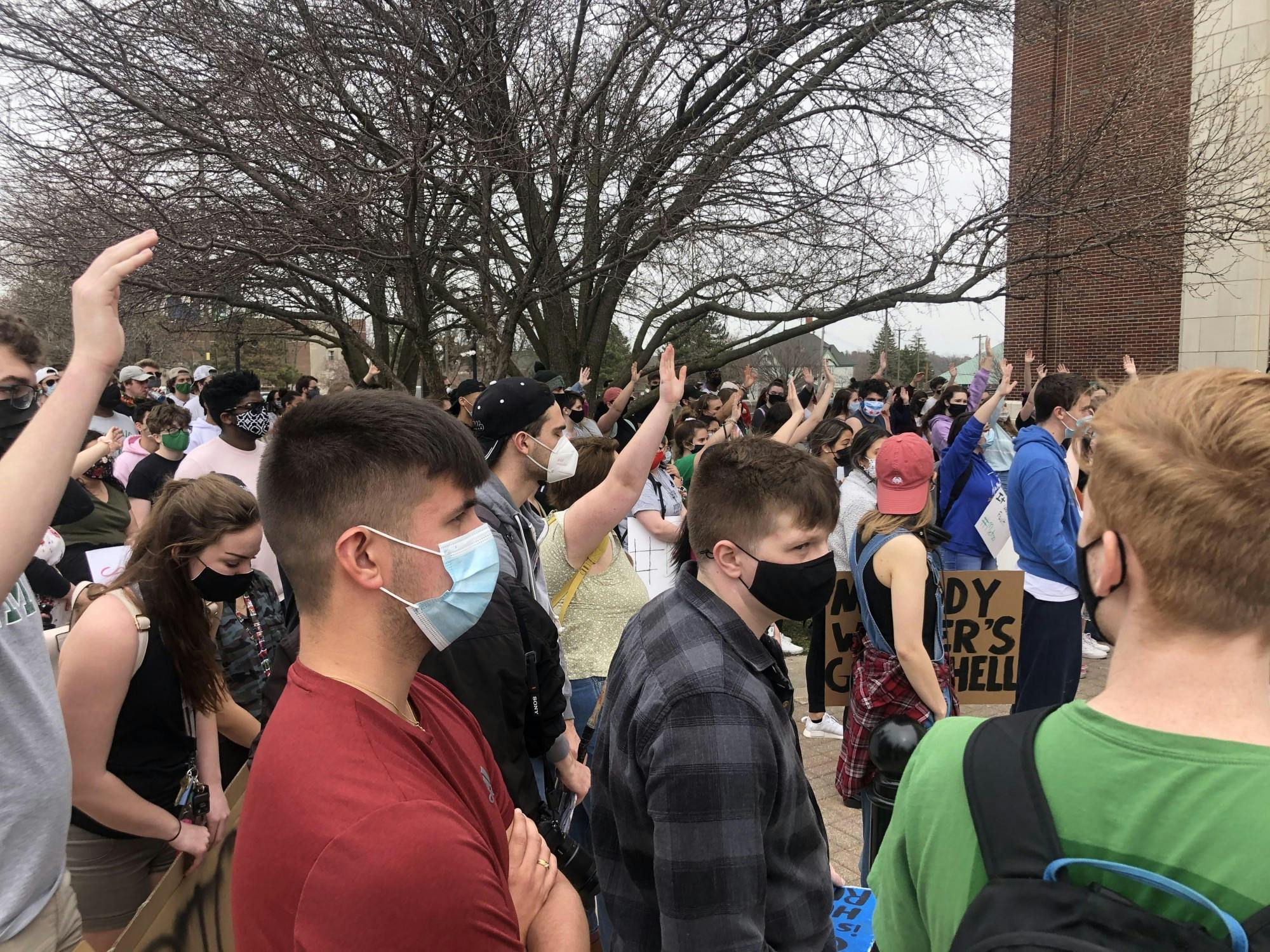
The first protest and march sparked inspiration for more students to speak up
On Thursday, March 25, about 150 people marched on the EMU campus, to demand change and justice.
Grason Dixon was present at the March. He’s a fourth-year student at EMU and the President of the InterFraternal Council (IFC), which is over the Fraternities including Alpha Sigma Phi, Delta Tau Delta, Tau Kappa Epsilon, and others.
“It was something that we talked about forever and I’m glad to see people finally get behind it...I was talking with Maddy earlier about getting a big pool of resources that we can send out to our chapters that is educational and effective as well as the council trying to educate and bring that to members. So that we can hopefully combat sexual assault and sexual harassment on our campus,” Dixon said.
Dixon hopes after conversations with Alyssa Mohr, the Fraternity and Sorority Life (FSL) graduate assistant, and Karen Thompson, FSL coordinator, that the three other councils, which are College Panhellenic Council (CPC), National Pan-Hellenic Council (NPHC), Multicultural Greek Council (MGC), sit down with the IFC council to help combat against sexual assault and harassment as a community.
One of the ways IFC has taken a step toward combating sexual assault and harassment is a bylaw change that was implemented last year before Dixon took over the position. The bylaw changes of Article 5 Section 3 summarizes that a chapter with a member formally accused of a felony charge, which includes sexual assault, robbery, etc., is to be suspended from their chapter until a formal decision has been made by law enforcement or a public judge and jury.
Students present at the protests also voiced the changes they want to see happen, and what standards they are now holding the University to.
“More education on the aspect of sexual assault, and what is going to happen to these men, like the consequences,” Hannah Petroski, a freshman at EMU, said. “Instead of how to prevent [sexual assault] we should focus on the consequences.”
Katie Lane-Waters, a junior at EMU, organized both marches to show support for the survivors of sexual assault.
“Enough is enough. One person who had to [allegedly] survive assault on our campus is too many; our institution is not doing enough to support survivors and stop this from happening again. Today we are marching for survivors, to demand our stories are heard, to demand justice, and to make people pay attention. We will not be silenced any longer because our stories are valid, our anger is valid, our pain and sadness is valid as well and we are not alone,” Lane-Waters said.
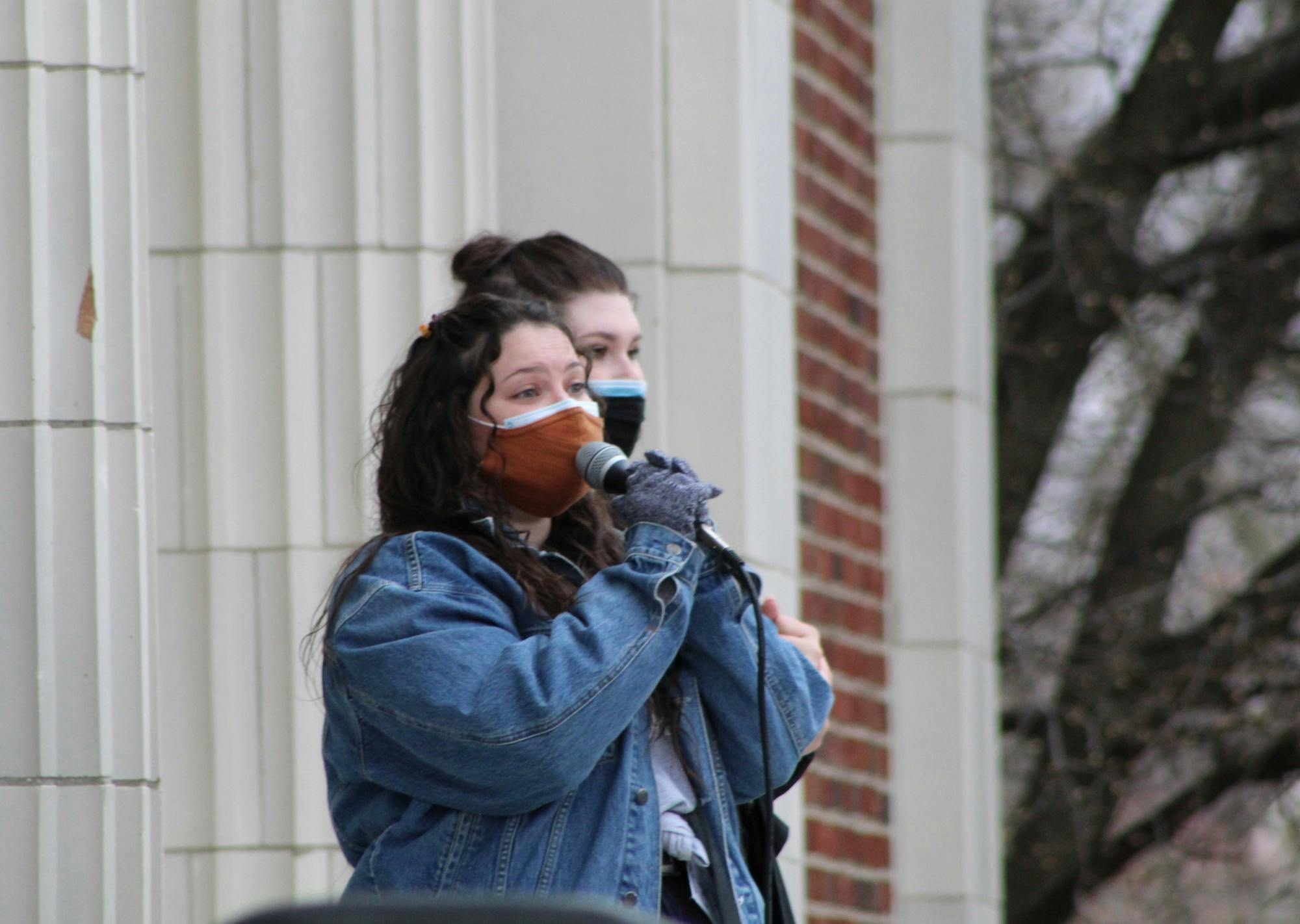
Lane-Waters hopes that the University will hear them and take the situation seriously.
“We decided to utilize our skills and our connections to our school and make this [march] happen so other survivors can feel supported and so our university can see that we are serious about this and we will demand change until it happens,” Lane-Waters said.
To feel heard by the University Lane-Waters wants their demands to be put into action.
“[We need] better education, better resources, and more accountability for those who are assaulting people on our campus,” Lane-Waters said.
EMU responded to the march on Thursday, March 25, with a statement:
“We share students' concerns over sexual assaults and fully endorse the expression of their views in this public manner. Protecting students is critical to the University’s educational mission, and our staff in law enforcement, Title IX, student affairs, and elsewhere work every day to try to provide a safe environment for our students to learn. The University stands with all survivors of sexual assault and is committed to supporting them. Every student should feel comfortable that they are safe on campus.”
The second protest on campus draws approximately 200 people
Approximately 200 people attended the second protest on Sunday, March 28, on EMU’s campus outside of Pease Auditorium. Students listened to speeches from sexual assault survivors, including statements from some of the women involved in the lawsuit against EMU.
A woman identified as Jane Doe #9, one of the 11 sexual assault survivors involved in the lawsuit gave a statement to be read, in which she described the close connections she has made to the other women who have come forward.
“This months-long process has been very exhausting for all of us. We all felt alone, and we’ve been keeping sisterhood, connected by the unthinkable. For me, it was not the therapy or the semester I took off school that helped me really begin to heal. It was, and continues to be, my fellow Jane Does,” Jane Doe #9 said.
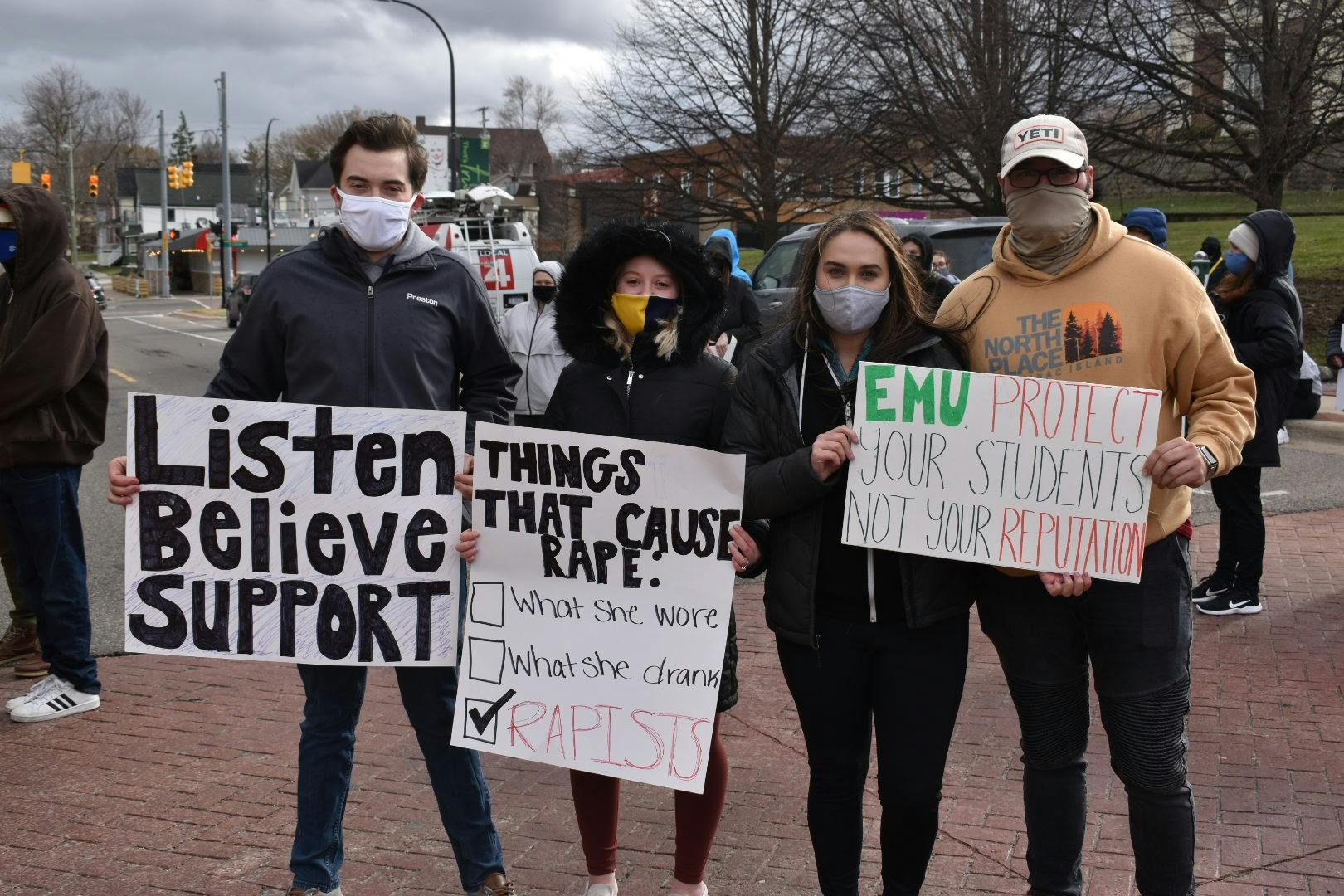
Signs could be seen throughout the crowd supporting survivors of sexual assault and criticizing the University for their response.
Among them was a sexual assault survivor, Alexis Gipson, a senior at EMU who came to the march to advocate for those who may be too fearful to speak up for themselves.
“I am a survivor of sexual assault myself . . . I know many people within my family, within my friend group, that are victims and have unfortunately been victims that can’t really speak up for fear or family, for fear of friends being lost, for the fear that people will tell them that it isn’t true or being silenced,” Gipson said.
As a senior, Gipson described how scared she was living on campus and seeing assaults happen around her, and to her. Gipson was once followed while walking on campus and hopes that no one else will have to go through that.
“I want people to be safe and I want future freshmen who are going to come here to not fear having to go out at night or not having to fear where they live . . . I hope that they [the University] can actually speak up and prove that they care about victims and they care about the situations and not just send empty words and emails,” Gipson said.













